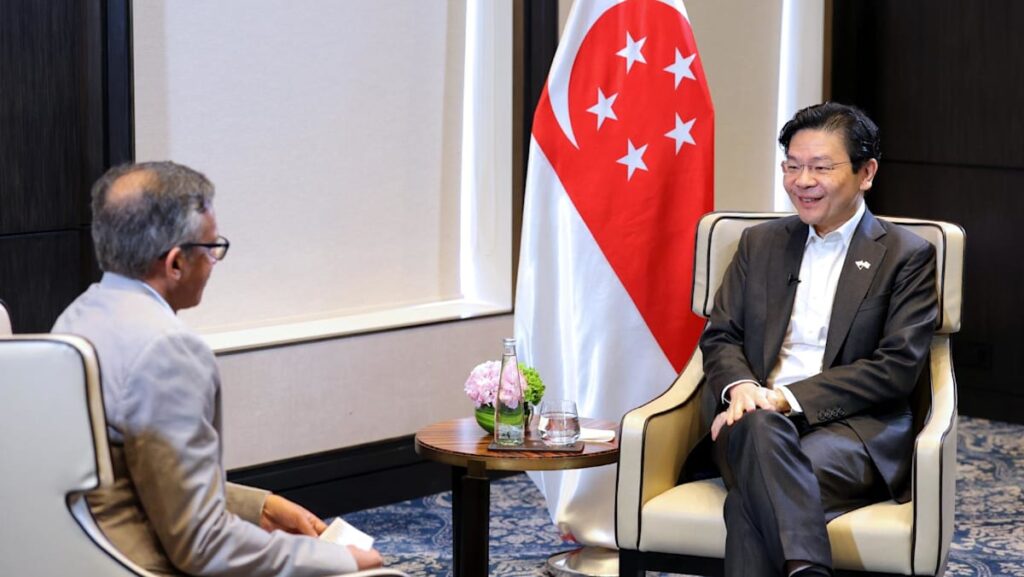“So when Prime Minister Modi and I last year announced our agreement to upgrade our bilateral relations to a Comprehensive Strategic Partnership, it is not just in name, it is in substance,” he said.
“We look forward to taking things forward and institutionalising the ISMR as a bilateral mechanism,” he added.
Mr Wong and Mr Modi are set to meet in New Delhi on Thursday.
They will be announcing a roadmap for Singapore and India’s Comprehensive Strategic Partnership – a high-level relationship that both countries upgraded ties to last year.
Mr Wong said the roadmap will be an “ambitious” one, setting out how both countries will pursue different pillars of cooperation.
“This will give clear direction and vision for the next phase of India-Singapore relations,” he added.
SEMICONDUCTORS
Mr Wong said that semiconductors was one area of cooperation that Mr Modi raised when he visited Singapore in September 2024.
Since then, both countries have signed a memorandum of understanding and made progress in three areas.
These are a “green lane” to facilitate the exchange of semiconductor goods and align standards; skills development with a potential training centre in Gujarat; and research and innovation.
Mr Wong said Singapore was interested in these collaborations because it wants a more diversified and resilient supply chain in the world, and India can contribute to this.
Singapore suppliers in the semiconductor ecosystem are also keen to see how they can grow their business in India.
“Thirdly, I would say, a strong and rising India contributes to stability, resilience and shared prosperity in Asia,” said Mr Wong.
“And that opens up new opportunities not just for India itself, but for its partners around the region, and that is why we are keen to see how we in Singapore can play a part in supporting India’s development in this industry.”
DATA, GREEN ENERGY AND FOOD SECURITY
There is scope for India and Singapore to have more seamless cross-border data exchange, with both countries exploring the possibility of a pilot cross-border data corridor, said the prime minister.
He noted that data underpins activities in finance and the digital economy, as well as the development and use of artificial intelligence, with the potential to do more together in these areas.
Singapore could also work together with India as Singapore explores green energy solutions like low-carbon hydrogen, carbon capture or credits and civilian nuclear power, said Mr Wong.
The ISMR has also discussed how to facilitate more trade in food and exchanges on food safety and regulatory standards, with Singapore continuing to welcome more imports from India to enhance food security, he said.
“OUR CONFIDENCE IN INDIA IS NOT NEW”
Singapore is India’s top foreign investor, accounting for almost a quarter of foreign direct investment equity inflows since 2000.
India’s investment in Singapore has also grown from S$481 million in 2004 to about S$31.6 billion in 2023.
Since the CECA came into force in 2005, annual bilateral trade has more than doubled from S$20 billion to S$52.2 billion in 2023.
Mr Wong said that while there were no safe bets with investments, Singapore is optimistic about India’s growth prospects because of its young population, rising middle class, dynamic tech sector and government committed to reforms.
“Our confidence in India is not new. It is not a recent thing. It is longstanding, and it is backed by proven track record and actions,” he said.
Mr Wong was also asked about a trade pact between India and the Association of Southeast Asian Nations (ASEAN) that was implemented in 2010.
The ASEAN-India Trade in Goods Agreement has been under review, with a 10th round of talks reportedly set for October.
Earlier this year, India’s Commerce Minister Piyush Goyal reportedly described the pact as “silly”. There have been other reports that Indian leaders want to fast-track the review.
“We understand India’s concerns,” said Mr Wong.
“We hope there will be flexibility on the part of the officials that are in the midst of the discussions so that they can reach a mutually acceptable outcome for all parties, because we want that trade to continue flowing. We want to have closer ties between ASEAN and India.”
As the centre of gravity of the global economy shifts to Asia over time, ASEAN can join India and China as the continent’s growth engines contributing to its stability, resilience and prosperity, he said.
“So it is within that context that there is a strategic imperative for closer ASEAN-India ties, and we want to encourage India to continue with its Act East policy and Singapore will do our part to facilitate these closer links between India and ASEAN,” Mr Wong added.
Read the full article here
